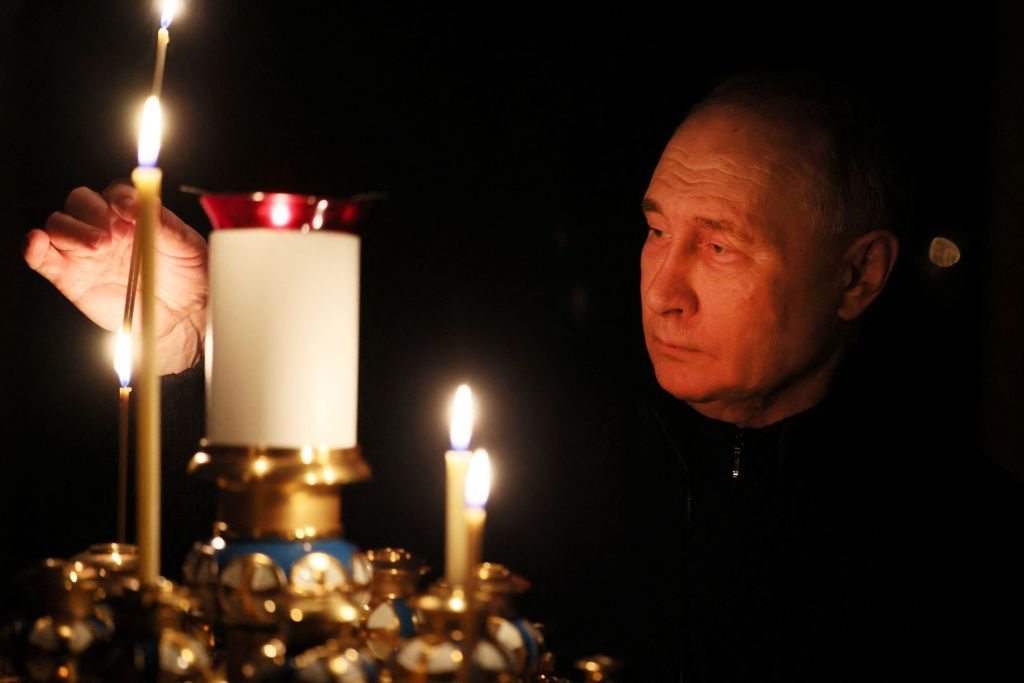Opinion: Ukraine may have no choice but to lower its fighting age

Ukrainian soldiers participate in a military training drill at an undisclosed location amid Russia's war in Donetsk Oblast, Ukraine, on March 6, 2024. (Jose Colon/Anadolu via Getty Images)

Brian Bonner
Former chief editor of the Kyiv Post
Editor’s Note: Brian Bonner, the Kyiv Post’s chief editor from 2008-2021, is the host of Hromadske Radio’s podcast “Ukraine Calling.” This weekly English-language program, released on Fridays, can be found on Hromadske’s YouTube channel and website, as well as on Spotify, Apple Podcasts, SoundCloud, Google Podcasts, and Twitter.
In Israel, every citizen can be drafted into the military at the age of 18. In Turkey, the age is 20. When the United States fought its ill-fated war in Vietnam, it sent men into battle at 18 – as many other nations do today. More ominously, Russia lowered its draft age to 18 this year as part of a drive to potentially recruit hundreds of thousands more soldiers to fight its war in Ukraine.
While Ukrainian men between the ages of 18 and 60 must register at military enlistment offices and are not permitted to leave the country under martial law, only those over the age of 27 are eligible for conscription. Over two years into Russia’s full-scale war, this leaves Ukraine’s exhausted armed forces with soldiers who are, on average, in their 40s and well past their physical prime for hard combat. This will force a hard decision on Ukraine’s politicians and society with time running short, especially with Russia preparing a spring or summer offensive.
Ukraine’s politicians have been reluctant to lower the fighting age because it would be unpopular. Many defend the relatively high combat age as a social virtue to protect Ukraine’s young adults from the battlefield unless they volunteer.
It’s laudable that the nation’s leaders want to protect their young, but in a war for survival, Ukraine simply needs more soldiers.
Last year, Ukraine's parliament approved legislation to lower the conscription age to 25, but President Volodymyr Zelensky did not sign it into law. Now, new legislation has been proposed to do the same, but lawmakers have not acted. If passed and signed into law, the pool of potential recruits would be enlarged by perhaps a few hundred thousand men. The legislation may pass out of necessity, but there is no guarantee that it has enough political support.
Zelensky proceeded to fire the then commander-in-chief of Ukraine’s Armed Forces, Valerii Zaluzhnyi, months after the popular general said Ukraine needed as many as 500,000 more soldiers.
Zelensky kicked the can down the road by ordering the Ukrainian military’s new commander-in-chief, Oleksandr Syrskyi, to audit the country’s conscripts. Presidential advisor Mykhailo Podolyak said that, while Ukraine has as many as 1 million personnel in uniform, less than 300,000 may have seen active combat. What the rest are doing is one of the questions the ongoing audit will answer.
No one wants to go to war. No one wants to be killed. I am an American who came of age in 1978, five years after my nation ended the draft and switched to a professional army of citizens who voluntarily enlisted. If a foreign enemy took over 20% of the U.S., it’s hard to imagine that anyone could escape military service.
Despite what French President Emmanuel Macron has recently suggested in his transformation from dove to hawk, foreign governments are not going to send their soldiers to fight Ukraine’s war – especially with so many Ukrainian men from 18 to 26 not in the fight.
Ukraine is being told this nicely, as my recent guest on Hromadske Radio’s “Ukraine Calling” program, Lieutenant General (Ret.) Ben Hodges, did. Few foreigners are more pro-Ukrainian than him, but even he said that Ukraine risks losing support – and aid – over the issue.
“When you see that Ukraine is not willing to do everything necessary to have everybody in the fight that is needed, this does run the risk of undermining some support for Ukraine,” Hodges told me.
Others are not so nice.
After meeting with Zelensky in Kyiv on March 18, U.S. Senator Lindsey Graham – a supporter of former U.S. President Donald Trump, who is no fan of Ukraine – bluntly told Ukraine to recruit more soldiers to fight. Graham voted against the $60 billion aid package that passed the Senate despite his opposition. Trump, however, is dead set against helping Ukraine, and consequently, the assistance package has been held up for months in the Republican-controlled and Trump-subservient U.S. House.

“I would hope that those eligible to serve in the Ukrainian military would join. I can’t believe it’s at 27,” Graham told the Washington Post on March 18 in Kyiv. “You’re in a fight for your life, so you should be serving – not at 25 or 27. We need more people in the line.”
Interestingly, Zelensky’s summary of the meeting made no mention of the issue.
Now that Trumpists have seized on the issue, Ukraine would be wise to act before the debate becomes yet another convenient excuse for Americans not to help.
Ukrainians can tell their allies that this issue is none of their business, but that is not a winning strategy for a nation that is so heavily dependent on the West.
Ukrainians and Ukrainians alone will decide the age at which citizens can be sent into combat. But decisions about whether to help Ukraine are made in foreign capitals. As Graham and Hodges’ comments suggest, the two issues are becoming linked.
With soldiers on the front line serving with little to no break from the fighting, it’s no wonder their military leaders want fresh troops. The anger of the soldiers on the line is seeping out.
“It should not be that someone is leading a nice life in Kyiv and Dnipro, and the military must fight,” Yehor Firsov, a deputy commander of a strike force in Ukraine’s eastern Donbas region, said at a conference in Kyiv on Feb. 24, the two-year anniversary of the full-scale war.
Inna Sovsun, a member of parliament, said she supports lowering the fighting age as a matter of fairness. She said she thinks the measure has the votes to pass Ukraine’s parliament.
“It’s been two years of hell for us,” Sovsun, whose partner has been fighting at the front for over two years, told Al Jazeera. “There is no just way to say who should serve and who shouldn’t, and there is no fair way of doing this, but at least it should be more equally distributed, this weight of war.”
Another member of parliament, Solomiia Bobrovska, told me: “The need for manpower is critical for our armed forces.”
While Kyiv and its residents, including myself, dream of a Victory Day parade that will celebrate the expulsion of Russian forces from all of Ukraine’s territory, this is not a realistic hope. Russia is not going to stop being an enemy soon, and its imperialistic yearning to recover its lost empire runs deep. It’s putting its economy on a perpetual war footing, as its $140 billion defense budget in 2024 suggests.
Zelensky said early in the war Ukraine needs to become a "big Israel." This goal will require a fundamental transformation of Ukrainian society. The nation will have to become more militarily self-sufficient and entice recruits by making them more confident that they will be trained, armed, and taken care of properly. Military experts say that if soldiers believe they will survive the battlefield, they are less likely to evade military service.
Americans lucked out geographically. We have oceans on our eastern and western borders and friendly neighbors on our northern and southern ones. Ukraine lives in a much rougher neighborhood. The nation’s survival will require having the strongest defense in Europe – not just now but most likely for generations to come. And that means, like other nations that have adopted a “total defense” policy, everyone who is able will have to join the fight if needed.
For Ukraine to win the war, its foreign allies must give Ukraine all the money and weapons it needs. But victory will also require that Ukraine takes Hodges’ friendly advice and do "everything necessary" to have everybody in the fight that is needed.
Editor’s Note: The opinions expressed in the op-ed section are those of the authors and do not purport to reflect the views of the Kyiv Independent.











